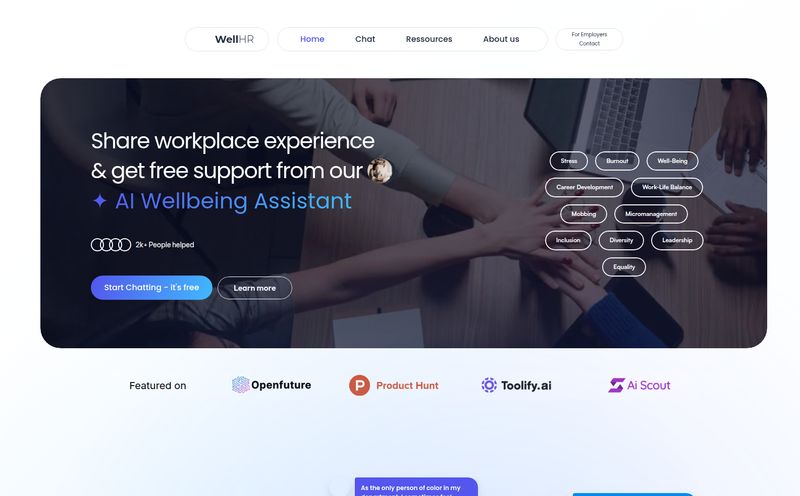It feels like every other day there's a new AI tool promising to change the world, or at least change how you run your business. The gold rush is real. Everyone wants their own slice of the AI pie, especially when it comes to creating custom chatbots. You know, an AI that actually knows your business, your products, your documents. Not some generic bot that gives canned answers.
In this chaotic landscape, I'd been hearing some good things about a platform called Libraria. The promise was simple and incredibly appealing: a no-code way to build a ChatGPT-style assistant trained on your own data. For an SEO and traffic guy like me, the potential applications immediately started spinning in my head. Imagine a bot on your site that can instantly answer hyper-specific user questions by referencing your entire blog archive, your product manuals, your support docs. That’s not just customer service; that's a conversion machine.
So, I went to check it out, ready to sign up and take it for a spin. And I was greeted by… well, a digital ghost town. A “Deployment Paused” error. It seems, for now at least, Libraria is on an unscheduled vacation. But does that mean the idea is dead? Not a chance. The platform's structure and feature set are too interesting to just ignore. So let's do a bit of digital archaeology and look at what Libraria was, and why it's a model worth paying attention to.
What Exactly Was Libraria? (Or Is It?)
At its core, Libraria was a tool designed to let anyone—and I mean anyone—create a smart chatbot. You didn’t need to be a developer who speaks Python in your sleep. If you could upload a file, you could use Libraria. The concept was about feeding the AI your own specific content. This could be anything from pointing it to your website’s sitemap.xml file, letting it crawl and learn everything, to uploading documents directly. We’re talking PDFs, Word docs, you name it.
Think of it like giving your company its own custom-built brain. A brain that has only ever read your material. It won't get confused about your return policy or start spouting nonsense about a competitor's product. It’s your knowledge, distilled into a conversational assistant. Simple as that.
The Standout Features That Caught My Eye
Every tool in this space has a gimmick. But Libraria’s feature list felt less like a gimmick and more like a well-thought-out solution to real problems businesses face when trying to implement AI.
No-Code, No Problem
This is the big one, isn't it? The term “no-code” gets thrown around a lot, but here it felt genuine. The whole point was to put this powerful tech into the hands of marketers, small business owners, and support teams without them needing to go hire an expensive development agency. This is how technology should work—making complex things accessible.
Taming the AI: Anti-Hallucination and Source Citing
For me, this was the killer feature. One of the biggest fears with AI is that it will just… make stuff up. We've all seen the screenshots of AI “hallucinations” where it confidently states something completely false. Libraria tackled this head-on. By grounding its answers in the documents you provided, it could dramatically reduce the chance of going off the rails. Even better, it was designed to cite its sources. So when a user gets an answer, they also get a link to the specific page or document the information came from. This builds immense trust and is something I wish more tools would do.

Visit Libraria
More Than Just a Widget
Libraria wasn't just a one-trick pony. It offered different “views” for your AI. You could embed a classic chat bubble in the corner of your website, create a full-page “Assistant” that felt more like a dedicated search portal, or just use the internal chat view for your own team. The ability to customize the branding, colors, and welcome messages was also a huge plus. It’s a small detail, but making the AI feel like a native part of your brand instead of a bolted-on third-party tool is huge for user experience.
Let's Talk Money: Libraria's Pricing Structure
Okay, so how much did this magic cost? The pricing model was actually one of the most attractive parts of the platform. It felt fair and scaled logically.
Here’s a quick rundown of what they offered:
- Free Plan: This was surprisingly generous. You got 250 free credits to start, the ability to create up to 10 public assistants, and could embed them on unlimited websites. For trying it out or for a very small project, this was perfect.
- Team Plan ($99/month): This was the main paid tier. It jumped you up to 25,000 credits a month, allowed for much larger content uploads, and—critically—gave you access to more powerful models like GPT-4. For any serious business implementation, this seemed like the sweet spot.
- Enterprise Plan (Custom Pricing): The classic “call us” plan. This was for the big players who needed massive credit allowances, custom support, and the ability to remove all Libraria branding and use their own domain. Standard stuff for enterprise software.
Honestly, the pricing felt right. It wasn't trying to gouge small users, and the cost scaled with usage. A real shame you can't sign up right now.
So... What's with the 503 Error? The Elephant in the Room
This brings us back to the big question. Why is a seemingly great platform showing a “Deployment Paused” message? A check of their pricing page and main site confirms it—the lights are off. On the tech side, it's a Vercel deployment that has been manually stopped by the owner.
What does this mean? It's hard to say for sure without an official announcement. It could be a number of things:
- A Pivot: The team might be re-tooling and planning to relaunch with a different focus.
- Acquisition: They could have been quietly acquired by a larger company that has temporarily taken the service offline while they integrate it. (This is the optimistic take).
- Funding Issues: The AI space is expensive. The cost of running these models is not trivial, and maybe the runway just ran out. It's a tough reality for many startups.
- Just a Pause: It might just be temporary. Maybe they're fixing a major bug or upgrading their infrastructure.
Whatever the reason, it's a cautionary tale. The tech world, especially the AI scene moves at a breakneck pace. It’s a bit of a wild west out there. Tools can appear and disappear overnight. That’s why it’s so important to have a backup plan and not put all your eggs in one unproven basket.
Frequently Asked Questions about Libraria
What was Libraria used for?
Libraria was primarily used to create custom AI chatbots for websites. Businesses could use it for automated customer support, lead generation, or as an interactive knowledge base for users or internal teams.
Did you need to know how to code to use Libraria?
Nope. It was a completely no-code platform. The main skill you needed was the ability to gather your data (like documents or a sitemap) and upload or point the tool to it.
How did Libraria handle incorrect AI answers?
Its main defense against AI “hallucinations” was grounding its responses in the source material provided by the user. It also included source citation, so users could verify where the information came from, which builds trust and accountability.
What kind of data could you use with Libraria?
It was very flexible, supporting direct uploads of files like PDFs, DOCX, and TXT, as well as crawling entire websites via their sitemap.xml file. It also had integrations with services like Google Drive.
Is Libraria still available?
As of late 2024, the service appears to be offline. The website shows a "Deployment Paused" error message, and it's not possible to sign up or use the tool.
What are some good alternatives to Libraria?
The space is crowded, which is good news! Some popular and stable alternatives for building custom chatbots include Chatbase, Dante AI, and Voiceflow. Each has its own strengths, so it's worth checking them out.
Final Thoughts on a Promising, Paused Platform
It's always a bit sad to see a promising tool go dark. Libraria seemed to get a lot of things right. It was accessible, powerful, and tackled the genuine problem of AI trust with its source-referencing features. Its pricing was fair, and the feature set was robust.
Whether Libraria comes back online or not, it serves as a great blueprint for what a user-friendly, business-oriented AI tool should look like. The demand for this kind of service isn't going away—if anything, it's exploding. For now, we'll have to look to the alternatives, but I’ll be keeping an eye out. Maybe, just maybe, the deployment will one day be resumed.
Reference and Sources
- Libraria's official website (currently inactive):
https://libraria.ai/ - Libraria Pricing Page (currently inactive):
https://libraria.ai/pricing/ - Chatbase:
https://www.chatbase.co/ - Dante AI:
https://dante-ai.com/ - Voiceflow:
https://www.voiceflow.com/



